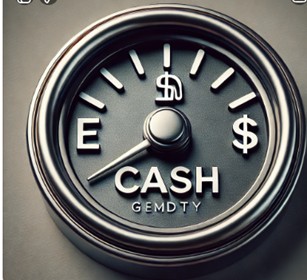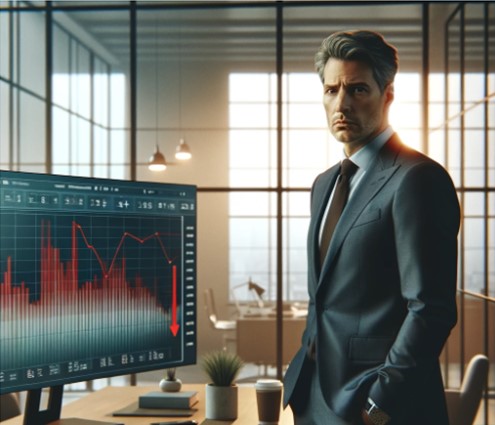Money in a business is like gas in your car. You need to pay attention so you don’t end up on the side of the road. But here’s the kicker—your business trip? It’s more like a tour of gas stations than a scenic drive to early retirement.

If you’ve ever been on the receiving end of a cash call, you know how those calls go. The founder’s voice is just a touch more nervous than usual. They say words like “bridge round,” “unexpected delay,” and “short-term liquidity.” Maybe they even toss in “scaling challenges” or “burn rate” if they’ve been reading too many venture capital blogs. But when you boil it down, it’s just one thing: they’re out of gas. And they need your wallet to tow them to the next station.
Now, I’ve been around this industry long enough to know that not every business that runs low on cash is a bad business. Sometimes, just like on a family road trip, you pass three perfectly good gas stations while arguing about directions, only to realize you should’ve stopped 50 miles ago. It happens. But there’s a difference between a minor detour and being stranded with your hood up, your hazard lights blinking, and a note taped to the windshield that reads, “Back in 15—hopefully.”
Modular construction isn’t a weekend lemonade stand
It’s capital-heavy, timing-sensitive, and full of beautiful plans that get derailed by ugly details. You’ve got factories to keep humming, supply chains that forget how to supply, and managers who forgot how to manage. So yes, investor money gets burned fast—especially when the owners treat their fuel gauge like a suggestion.
Here’s the thing about these “gas station tours.” Most startups think there’s always another one around the bend. They act like the next investor or grant or state program is just over the next hill. But this isn’t Route 66—it’s a desert sometimes, and your co-founder forgot to bring water. Too many startups believe the tour will end with a big exit or an acquisition that lets everyone high-five their way into early retirement. But more often than not, that tour ends when the investors stop answering the phone.
I had a founder once tell me they were “conservatively budgeting” for 18 months of runway. That sounded good—until I asked what they meant by conservative. Turns out, they meant “assuming we get another $3 million round in six months.” That’s not conservative. That’s gambling with someone else’s chips and acting shocked when the house wins.
Cash calls happen
But repeated cash calls are like trying to run a NASCAR team with one gallon of fuel per lap. It’s a red flag—and investors know it. The first time they reach into their pocket, it’s with optimism. The second time, it’s with hesitation. The third time? They’re checking how to write off a loss.
And yet, many factory owners and startup dreamers don’t even flinch before dialing their backers. They treat investors like an ATM with a business card. Some even build their models around serial fundraising—never quite fixing the leaks, just patching the tank and hoping it holds until the next top-off.
Let’s get something straight. Investors aren’t tour guides—they’re passengers. They bought into the destination you promised. They expect progress. But if you keep circling the same rest stop, don’t be surprised when they ask to get out and hitch a ride with someone who looks like they know where they’re going.
Now, this isn’t to say founders should never ask for more money. But when they do, they better come with receipts, not excuses. What changed since the last raise? What systems were improved? Where did the money go, and what’s the realistic plan for turning gas into forward motion? Not just more flashing lights and promises.
I’ve seen modular factories that had everything—talent, tech, and a target market—fail because no one kept an eye on the gas gauge. I’ve seen the opposite too: gritty little teams that tracked every penny and stretched every dollar like a marathon runner nursing their last water bottle. Those are the ones who, when they call for money, get it—because they earned the trust.
If you’re an investor reading this, don’t be afraid to ask the hard questions when the next cash call comes in. Ask for KPIs, not just PowerPoints. Ask what’s changed—not just what’s hopeful. Ask what happens if this raise falls short. Because the honest ones will tell you. The rest? They’re just hoping you’ll hand them a gas can and not ask too many questions.
And if you’re a founder or factory owner, take a long, hard look at your dashboard. Are you measuring everything that matters? Are you planning for flat tires, not just green lights? Do you know when the next cash call is coming—or are you hoping it never does?
There’s a world of difference between running lean and running empty. One is smart. The other is just waiting to stall.
So yes, business is a tour of gas stations. But you better not be sightseeing. Keep the tank filled, the gauges honest, and the route clear.
Because nobody wants to be the modular startup stranded on the side of the road, holding a cardboard sign that reads: Investor Needed. Again.
.
Gary Fleisher, The Modcoach, writes about the modular and offsite construction industry at Modular Home Source.
.
CLICK HERE to read the latest edition
Contact Gary Fleisher












